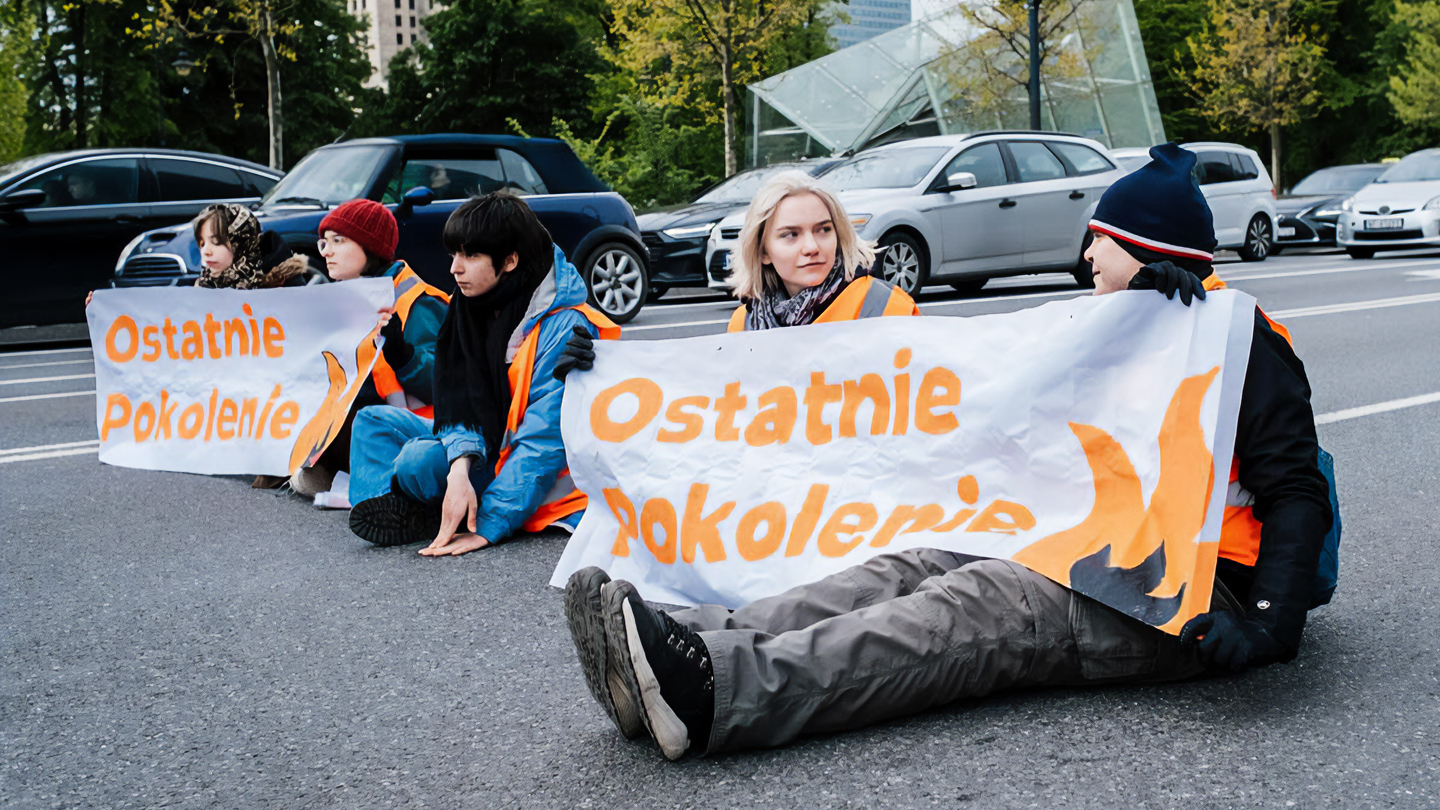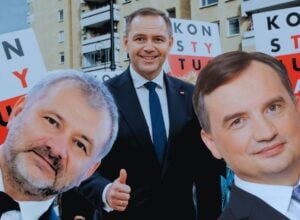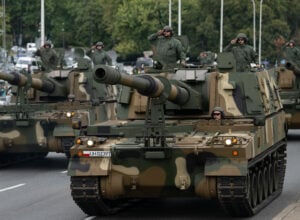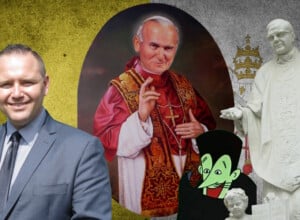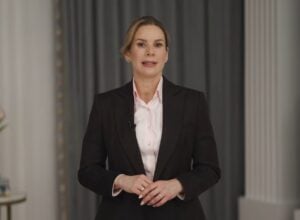Od redakcji: Blokady Ostatniego Pokolenia, młodych aktywistów działających na rzecz klimatu, stały się najbardziej wyrazistym ruchem obywatelskiego oporu w ciągu roku od przejęcia władzy przez partie koalicji demokratycznej – i podzieliły Polskę.
Zaproponowaliśmy aktywistom i aktywistkom z Ostatniego Pokolenia miejsce na naszej stronie – tak by mogli zaprezentować swoje argumenty w publicystycznej formie i dotrzeć także do tych, którzy nie zawsze rozumieją motywacje stojące za blokowaniem dróg i postulatami, które podnoszą. Bo to, co robi Ostatnie Pokolenie i inne organizacje alarmujące w sprawie klimatu, jest demokratyczną polityką.
*
„Chuligańskie wybryki czy uprawnione obywatelskie nieposłuszeństwo?” – pyta TVN24. Lech Wałęsa na Facebooku pisze: „solidaryzuję się i protest popieram. Nie popieram jednak form, metod protestu”. W związku z listem poparcia dla Ostatniego Pokolenia ponad setki działaczek byłej „Solidarności” i opozycji demokratycznej, prawników oraz ludzi nauki i kultury „Wyborcza” publikuje pożal się boże opinię Piotra Beniuszysa z uroczym stwierdzeniem: „Pomiędzy klimatycznym denializmem a klimatyczną histerią jest cała paleta godnych polecenia postaw”. Ostapiuk w Oko.press doradza: „Obawiam się, że Ostatnie Pokolenie swoimi metodami może zniechęcić wiele osób do walki ze zmianami klimatu […]”.
Prosicie nas: nie mówcie tak ostro, bo nikt tego nie zaakceptuje. Nie bądźcie tacy radykalni, bo zrażacie do siebie opinię publiczną. Nie protestujcie w sposób, który polaryzuje społeczeństwo.
Skonfrontujmy się więc z tą sprzecznością, bo to najciekawsze, co z tych opinii wyziera. Jak to jest, sympatyzujecie, ale nie popieracie? Zgadzacie się z postulatami, ale nie metodami? Protestować możemy, ale nie tak, by było nas słychać? Możemy mówić szczerze o kryzysie klimatycznym, byle nikogo nie straszyć?
Wasze komentarze przypominają mi jeden z moich ulubionych cytatów:
„Doszedłem prawie do godnego pożałowania wniosku, że największą przeszkodą dla Murzyna w jego drodze do wolności nie jest członek Rady Białych Obywateli ani Ku Klux Klanu, ale biały centrysta, który jest bardziej oddany »porządkowi« niż sprawiedliwości; który woli negatywny pokój, który jest brakiem napięcia, od pozytywnego pokoju, który jest obecnością sprawiedliwości; który ciągle mówi: »Zgadzam się z tobą co do celu, do którego dążysz, ale nie mogę zgodzić się z twoimi metodami akcji bezpośredniej« […]. Płytkie zrozumienie ze strony ludzi dobrej woli frustruje bardziej niż całkowite niezrozumienie ze strony ludzi złej woli. Umiarkowana akceptacja wprawia w większą konsternację niż całkowite odrzucenie”.
To fragment Listu z więzienia w Birmingham, w którym Martin Luther King konfrontuje się z reformistyczną krytyką jego kampanii ze strony białych chrześcijan oraz tej części czarnej społeczności, która zrezygnowała z walki i dostosowała się do systemu segregacji.
Mnie też frustruje to „płytkie zrozumienie” – w naszym przypadku: zagrożenia, jakie niesie zapaść klimatu i głębokiej niesprawiedliwości, która z niego wynika. Nie mogę przejść obojętnie obok bezkrytycznie powtarzanych frazesów o aktywistach, proteście czy radykalizmie. Za sprawą blokad ulicznych Ostatniego Pokolenia wiele osób zaangażowało się w doradzanie protestującym, jak robić to poprawnie. Czuję się więc w obowiązku, by tym osobom, opiniotwórcom wszelkiej maści, zaproponować kilka rad dotyczących uczestniczenia w debacie publicznej w czasach zapaści.
Potraktujcie nasze cele poważnie
Po pierwsze, chcę zwrócić uwagę na to, że rolą protestu nie jest, a przynajmniej nie musi być budowanie społecznego poparcia dla ruchu. A jednak to jeden z najczęstszych argumentów, jakie napotykam wśród krytyków Ostatniego Pokolenia.
„Eksperci”, którzy w mediach twierdzą, że Ostatnie Pokolenie jest nieskuteczne, skoro prowadzi kontrowersyjne akcje, opierają tę tezę na błędnych założeniach. Gdyby niechęć do protestujących była wyznacznikiem sukcesów ruchów społecznych, to niszczące obrazy i wybijające szyby sufrażystki przegrałyby walkę o prawa wyborcze kobiet. Skoro w latach 60. aż 85 proc. Amerykanów twierdziło, że protesty czarnych szkodzą ich sprawie, ruch praw obywatelskich nie mógłby osiągnąć jakichkolwiek sukcesów. To zupełnie naturalne, że publiczny protest spotyka się z falą niezadowolenia postronnych obywateli. Protest burzy porządek i spokój – i właśnie po to jest.
Jak w wywiadzie dla TVP Info trafnie podsumował to Władysław Frasyniuk: „Nas [ludzi „Solidarności”] też była mniejszość, a zdecydowana większość albo milczała, albo miała do nas pretensje, że przez nas ludzie tracą pracę, idą do więzień i spotykają się z innymi represjami”.
Przypomnijmy więc, że dla ruchu społecznego równie istotne, jeśli nie istotniejsze, są widoczność i rozpoznawalność, możliwość swobodnej wypowiedzi w mediach masowych oraz rekrutacja nowych członków. Z tym Ostatnie Pokolenie radzi sobie doskonale, a zawdzięcza to polaryzacji, nie jej unikaniu. Nie powstały również przekonujące badania, które by pokazały, że radykalne protesty zniechęcają do polityki klimatycznej.
Często przywoływany jako dowód w sprawie sondaż More in Common przeprowadzony w Niemczech w żadnym momencie nie sprawdza społecznego poparcia dla postulatów ruchu klimatycznego. Przeciwnie, szereg sondaży potwierdził przeciwną obserwację: że nie ma związku między poparciem dla protestów a poparciem dla postulatów ruchu.
Tym, którym szczerze zależy na powodzeniu ruchu klimatycznego, proponuję więc albo zainteresować się strategią Ostatniego Pokolenia i dołączyć do któregoś z naszych spotkań otwartych, albo spróbować samemu założyć inną organizację, która skutecznie przebije się do głównego nurtu. Na takiej zdrowej konkurencji tylko skorzystamy.
Weźcie odpowiedzialność za debatę publiczną
Po drugie, zmierzmy się w końcu z osądem, że radykalne protesty zniechęcają opinię publiczną. Jak często bywa, nie jest on całkowicie błędny, ale opiera się na nadmiernym uproszczeniu. Jak bowiem wyjaśnić fakt, że blokady dróg są akceptowalne, gdy robią to rolnicy, a oburzające, gdy blokuje Ostatnie Pokolenie? W debacie publicznej nie uczestniczą przecież tylko protestujący i opinia publiczna. Znacznie silniejszy wpływ na to, o czym i jak się mówi, mają media i osoby publiczne. To właśnie oni na wiele sposobów starają się wywołać wrażenie, że między „zwykłymi ludźmi” a „aktywistami” istnieje przepaść niezrozumienia.
Pierwszą, dość prostą strategią jest dobór odpowiedniego języka. Ostatnie Pokolenie to warszawska młodzież, raczej odklejona od rzeczywistości i do Polaków w ogóle niepodobna. W dodatku to „aktywiści”, ta znienawidzona w Polsce grupa moralizatorów, obrazoburców i mącicieli. Warto też wspomnieć w artykule, że „zdaniem niektórych” to „ekoterroryści” lub „grupa przestępcza, a nikomu już nie będzie ich żal.
Dziennikarz próbujący zniechęcić opinię publiczną do Ostatniego Pokolenia ma zasadniczo dwa cele. Jeden to ukryć wszelkie cechy osobiste protestującej osoby, z którymi odbiorca się utożsami: to, że jest matką, sąsiadką czy nauczycielką; to, że pochodzi z Chorzowa; to, że blokuje ruch pierwszy raz i się boi. Drugi to odwrócić kota ogonem. Zamiast zapytać: „dlaczego rząd nie chce zrealizować postulatów Ostatniego Pokolenia?” albo „co musimy zrobić, by uniknąć najgorszych skutków kryzysu klimatycznego?” wykorzysta sprawdzony whataboutism: „a co, jeżeli w korku utknie karetka?”. „A co z emisjami w Chinach?”
Powiem więc wprost. Przestańcie nas nazywać młodymi aktywistami. Zacznijcie rozmawiać z rodzicami i dziadkami, którzy siadają na jezdni. Zapytajcie blokujących, skąd przyjechali do Warszawy na protest.
Zamiast mówić „popieram was, ale muszę być adwokatem diabła”, spróbujcie być chociaż raz adwokatami dobrej sprawy.
Przedstawcie szczere intencje
Choć głęboko wierzę, że strategia Ostatniego Pokolenia daje nam stosunkowo największą szansę na sukces, cała ta debata o sukcesach, korzyściach, porażkach i słabościach naszego ruchu to samo w sobie odwrócenie uwagi od podstawowego argumentu, który stawia człowiek przyklejony do Wisłostrady.
„Jestem tutaj dla moich wartości, robię coś dobrego”.
Z tym trudno dyskutować, więc osoby publiczne albo próbują to ośmieszyć, albo całkowicie ignorują. Jest jednak również inna droga. Spotkanie ze szczerością intencji protestujących może nam wszystkim przypomnieć o tym, jakiej obywatelskiej wspólnoty, jakiej przyszłości i jakich postaw w momencie kryzysu chcemy od siebie oczekiwać.
Taką obywatelską odwagę pokazało nam już setki ludzi w ostatnich tygodniach i miesiącach. Ewa Siedlecka, Miłosz Wiatrowski, Jacek Żakowski i Joanna Szczepkowska, którzy jako jedni z pierwszych poparli Ostatnie Pokolenie publicznie. Władysław Frasyniuk, Danuta Kuroń, Marta Lempart, Agnieszka Holland i wielu innych sygnatariuszy listu Apelu poprzednich pokoleń. A dziś również redakcja Krytyki Politycznej, która rozumie, że także dziennikarz każdym słowem i każdą kropką wybiera stronę.
Proszę was dziś o odwzajemnienie szczerości. Zamiast waszych rad i opinii przyjmiemy ze zrozumieniem zarówno wasze poparcie, jak i waszą wrogość. Historia osądzi, kto miał rację.
**
Andrzej Jurowski – student socjologii i antropologii na Uniwersytecie Warszawskim. Od kilku lat łączy pracę i działania społeczne. Współzałożyciel i jeden z liderów Ostatniego Pokolenia.

 Wspieraj
Wspieraj 

 Wspieraj
Wspieraj  Wydawnictwo
Wydawnictwo 
 Przekaż
Przekaż 